As the Obama-Biden Transition team considers possible Cabinet level appointments to the incoming administration, a number of Black Americans’ names are surfacing as possible picks. The possibility of a Black serving on the President’s Cabinet is no longer the groundbreaking news it was when Harvard economist Dr. Robert Weaver was appointed by President Lyndon Johnson to serve as the secretary of the newly created Department of Housing and Urban Development in 1966. Since that time there have been a number of Black Americans, including Patricia Harris, Ron Brown, Colin Powell, and Alexis Herman to name a few, who have led federal agencies in presidential administrations.
The current group of possible appointees has varying backgrounds and experience in government. All of the names that have been circulated over the last week have some degree of public notoriety, either from service at the federal level or their presence in their home states. Most importantly they are being considered for leadership of federal agencies that are particularly important to the interests of Black American; such as the Department of Education and the Department of Labor. We detail below the most current roster of Black Americans that have been rumored to be on the Obama-Biden Transition team’s short list.
Department of Justice
Governor Deval L. Patrick
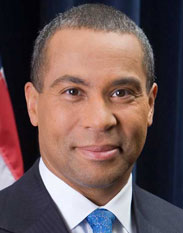 Deval Laurdine Patrick was born July 31, 1956 in Chicago, Illinois. Raised by a single mother and in poverty on the city’s South side, Patrick was a bright child who excelled in school. He attended the Milton Academy preparatory school and from there went on to Harvard College, where graduated cum laude in 1978 with an A.B. degree. After Harvard Patrick stayed in Cambridge and enrolled in Harvard Law School. He graduated with honors in 1982.
Deval Laurdine Patrick was born July 31, 1956 in Chicago, Illinois. Raised by a single mother and in poverty on the city’s South side, Patrick was a bright child who excelled in school. He attended the Milton Academy preparatory school and from there went on to Harvard College, where graduated cum laude in 1978 with an A.B. degree. After Harvard Patrick stayed in Cambridge and enrolled in Harvard Law School. He graduated with honors in 1982.
Patrick was a law clerk to Judge Stephen Reinhardt on the U.S. Court of Appeals, 9th Circuit after graduation from Harvard Law School. He went on to serve as the Assistant Counsel for the NAACP Legal Defense and Education Fund from 1983 until 1986, and became a Partner with the firm of Hill and Barlow in 1986. He left the firm to assume the position of Assistant Attorney General in the Civil Rights Division of the U.S. Department of Justice in the Clinton administration in 1994. At the Justice Department he served under Attorney General Janet Reno. He returned to private practice in 1997, becoming vice president and general counsel at Texaco in 1999 and executive vice president and general counsel at The Coca Cola Company in 2001.
During his tenure in the Justice Department he successfully settled a public accommodations lawsuit against restaurateur Denny’s; the largest racial discrimination claim in history. In another matter he compelled a Maryland bank, Chevy Chase Federal Savings, to serve Black neighborhoods and provide low-interest loans to their residents despite the fact that the bank had not discriminated against anyone. It was a move that conservative critics railed against, criticizing Patrick’s for actions that they claimed was excessive and heavy handed.
In 2005 Patrick launched an improbable and long-shot bid for governor of Massachusetts. He won the Democratic nomination the next year with 49 percent of the vote, defeating Tom Reilly and Chris Gabrielli, and was elected in November as the Bay State’s first Black governor and only the second in the nation’s history elected to lead a state. Patrick assumed office as Massachusetts’ 71st Governor on January 4, 2007. Patrick is married to Diane Bemus and they have two children, Sarah and Katherine.
Eric H. Holder, Jr.
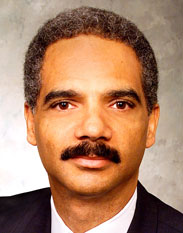 Eric H. Holder, Jr. was born in Queens, New York in 1951 to working class parents who emigrated from Barbados. A bright child, he was accepted into New York City’s elite Stuyvesant High School in Manhattan. After earning his high school diploma Holder enrolled in Columbia University where he majored in history. During his undergraduate years Holder became involved in Harlem community life and volunteered to help young people in the area. After receiving his degree in 1973 Holder was accepted into Columbia Law School and graduated three years later with his J.D. degree.
Eric H. Holder, Jr. was born in Queens, New York in 1951 to working class parents who emigrated from Barbados. A bright child, he was accepted into New York City’s elite Stuyvesant High School in Manhattan. After earning his high school diploma Holder enrolled in Columbia University where he majored in history. During his undergraduate years Holder became involved in Harlem community life and volunteered to help young people in the area. After receiving his degree in 1973 Holder was accepted into Columbia Law School and graduated three years later with his J.D. degree.
After receiving his law degree, Holder joined the Department of Justice and worked in the relatively new Public Integrity Unit. The division was created in the aftermath of the Watergate incident. While at the Justice Department Holder prosecuted several high profile cases, including former South Carolina Congressman John W. Jenrette, a figure in the infamous Abscam case that felled several Members of Congress. President Ronald Reagan appointed Holder to the Superior Court of the District of Columbia, a position that brought him in close contact with many young Black men who had become captive to criminal behavior.
In 1993 President Bill Clinton appointed Holder to be the District of Columbia’s first Black U.S. Attorney. The appointment came after a panel of local leaders formed by Rep. Eleanor Holmes Norton recommended his name after calls from the community demanding a Black be appointed in the spot. During his tenure at the Justice Departent Holder presided over the investigation into the House of Representatives post office, a probe that targeted, among others, the then powerful chairman of the Committee on Ways & Means, Illinois Democrat Dan Rostenkowski.
Holder is married to Sharon Malone and they have a daughter. Maya.
Charles Ogletree, Jr.
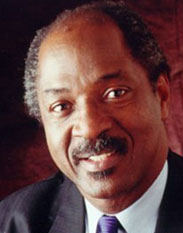 Charles Ogletree, Jr. was born on December 31, 1952 in Merced, California. His family was part of the migrant worker community in the northern California community and once he became old enough Charles worked in the fields. His life was shaped by an incident during his youth involving one of his close high school friends, who, though bright and talented, his friend had angered the white community of Merced by dating the white daughter of a judge. Soon, his friend’s life was in a downward spiral, accused of setting fire to the high school football coach’s car, shipped off to a youth camp, and eventually winding up in San Quentin after he was charged with killing a white inmate in the youth facility. The experiences of his friend shaped Ogletree’s passion for justice.
Charles Ogletree, Jr. was born on December 31, 1952 in Merced, California. His family was part of the migrant worker community in the northern California community and once he became old enough Charles worked in the fields. His life was shaped by an incident during his youth involving one of his close high school friends, who, though bright and talented, his friend had angered the white community of Merced by dating the white daughter of a judge. Soon, his friend’s life was in a downward spiral, accused of setting fire to the high school football coach’s car, shipped off to a youth camp, and eventually winding up in San Quentin after he was charged with killing a white inmate in the youth facility. The experiences of his friend shaped Ogletree’s passion for justice.
After graduating from high school in 1970 Ogletree enrolled in Stanford University and found himself part of the Black Power movement. He organized an Afrocentric dormitory and edited a campus newspaper called The Real News. It was at Stanford that he met his wife Pamela Barnes. Ogletree was inspired to pursue a career as a litigator after attending the trial of Black Power activist Angela Davis. When he graduated from Stanford in 1974, he stayed for one year to earn his masters degree and then enrolled in Harvard Law School in 1975. At Harvard he became national president of the Black Law Students Association.
Ogletree began his career in the District of Columbia’s Public Defender’s Office, representing the poor when they were accused of a crime and could not afford an attorney. He became the agency’s director of staff training while also teaching at American University and Antioch Law School. He quickly gained a reputation as a formidable presence in the courtroom and eventually left the Public Defender’s Office to be a partner in the Washington based firm Jessamy, Fort & Ogletree. At the same time he served as a visiting professor at Harvard Law School. He returned to Harvard in 1986 and became the director of the introduction to trial advocacy workshop, and founded and became director of the school’s Criminal Justice Institute in 1990. The next year he wrote a paper critiquing the appointment of Clarence Thomas to the U.S. Supreme Court that influenced the NAACP’s opposition to the Republican nominee to the high Court. Ogletree would later represent law professor Anita Hill during the Senate confirmation hearings of Thomas.
Ogletree and his wife have two children, Charles J. III and Rashida Jamila.
Rep. Artur Davis
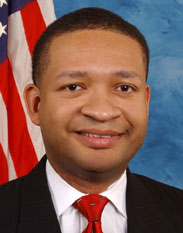 Artur Davis was born on October 9, 1967 in West Montgomery, Alabama and was raised by his mother and grandmother in a poor household. He was a studious child who distinguished himself in the classroom. His success in the classroom earned him a scholarship to Harvard College, where he graduated magna cum laude in 1990. He went on to be admitted to Harvard Law School and while there interned for Senator Howell Heflin of Alabama. After law school he returned to his native Alabama and worked as an intern for the Southern Poverty Law Center. He later clerked for Judge Myron Thompson of Montgomery and then was appointed assistant U.S. attorney for Alabama’s Middle District in 1994.
Artur Davis was born on October 9, 1967 in West Montgomery, Alabama and was raised by his mother and grandmother in a poor household. He was a studious child who distinguished himself in the classroom. His success in the classroom earned him a scholarship to Harvard College, where he graduated magna cum laude in 1990. He went on to be admitted to Harvard Law School and while there interned for Senator Howell Heflin of Alabama. After law school he returned to his native Alabama and worked as an intern for the Southern Poverty Law Center. He later clerked for Judge Myron Thompson of Montgomery and then was appointed assistant U.S. attorney for Alabama’s Middle District in 1994.
While in the U.S. attorney’s office he gained visibility by prosecuting drug cases and regularly appearing on a local Birmingham television station as a legal commentator. In 1998 Davis opened his own law office in Birmingham, specializing in civil rights law. However, it was not before long that Davis started to set his sights on the political arena.
In 2000 he challenged an incumbent Black member of Congress, Earl Hilliard, a political institution in Alabama and considered invincible. Davis lost that race but came back in 2002 for a rematch. That race was markedly different because the 7th congressional district had been altered by redistricting and key areas of Hilliard’s base of support had been removed. Hilliard was also plagued by controversy over a trip to Libya that offended Jewish voters and his reprimand by the House Ethics Committee for using campaign funds for personal use. Davis used these points well against Hilliard and beat the ten year incumbent in a runoff election, 56 to 44 percent. Much of his financial support came from out of state donors, including significant support from the Jewish community.
Davis has gained a reputation as a centrist Democrat and is co-chair of the New Democrat Caucus and is a member of the Steering and Policy Committee that approves policy and rules changes for the Democratic Caucus. Rep. Davis sits on the House Ways & Means Committee and the Judiciary Committee.
Department of Commerce
Ron Kirk
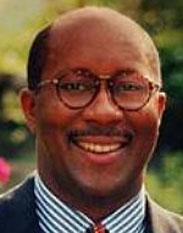 Ron Kirk was born June 27, 1954 in Austin, Texas, the son of a postal worker and school teacher, and the youngest of four children. His parents were active in their community and embedded their children with Christian values. Kirk attended public schools during the turbulent years of school desegregation in Austin but was not particularly affected by the racial strife in the larger community. His ability to win people over was reflected in his election as student body president as a high school senior.
Ron Kirk was born June 27, 1954 in Austin, Texas, the son of a postal worker and school teacher, and the youngest of four children. His parents were active in their community and embedded their children with Christian values. Kirk attended public schools during the turbulent years of school desegregation in Austin but was not particularly affected by the racial strife in the larger community. His ability to win people over was reflected in his election as student body president as a high school senior.
Kirk went on to attend Austin College, one of only a handful of Black students on the campus, and would experience difficulties fitting in. He left college his sophomore year and returned home to his parents. During his time at home he interned as a legislative aide to the Texas Constitutional Convention and became fascinated by politics. Kirk returned to Austin College with a new perspective and passion, and completed a degree in political science and sociology in 1976. He went on to the University of Texas Law School upon receiving his undergraduate degree and continued to intern as a legislative aide. He received his law degree in 1979.
After two years in private practice, Kirk joined Texas Senator Lloyd Bentsen’s Washington staff for two years before returning to Texas with a better focus on his career options in the political arena. He joined the staff of the Dallas City Attorney’s Office and rose to the position of chief lobbyist for the city. In 1994 Kirk was appointed Texas Secretary of State by Governor Ann Richards but made it known he was only interested in completing the term of the previous secretary who had resigned to accept a federal judgeship. Kirk was focused on making a run for mayor of Dallas and launched his bid in the spring of 1995. One of six candidates in the field Kirk had the backing of the city’s Black community and many whites in the business community. On May 6, 1995 Ron Kirk was elected the first Black mayor of the city of Dallas with 62 percent of the vote. His closest rival had 22 percent of the vote. Kirk won re-election in 1999 by a large margin. Three years later though, Kirk would suffer a political setback when he was defeated in a bid for Senator Phil Gramm’s open seat.
Kirk is married to Matrice and they have two children, Elizabeth Alexandra and Catherine Victoria.
Department of Labor / Department of Housing & Urban Development
Rep. James Clyburn
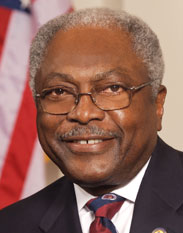 James “Jim” Clyburn was born on July 21, 1940 in Sumter, South Carolina, the son of a minister. Clyburn was an activist at an early age, having been elected president of his NAACP youth chapter when he was 12 years old. He grew up knowing many of the families in the landmark school desegregation case Briggs v. Elliott that was later incorporated into Brown v. Board of Education, and expressed an interest in politics and government early in his life.
James “Jim” Clyburn was born on July 21, 1940 in Sumter, South Carolina, the son of a minister. Clyburn was an activist at an early age, having been elected president of his NAACP youth chapter when he was 12 years old. He grew up knowing many of the families in the landmark school desegregation case Briggs v. Elliott that was later incorporated into Brown v. Board of Education, and expressed an interest in politics and government early in his life.
He attended historically Black South Carolina State College (now University) and earned a Bachelor of Science degree in 1962 at the height of the civil rights movement. Clyburn became intricately tied to the fruits of the movement when he was named the director of Neighborhood Youth Corps in 1966 and two years later became the executive director of the South Carolina Commission for Farm Workers. In 1970 he ran for the South Carolina House of Representatives and lost the election by 500 votes.
Clyburn soon found himself within the inner circle of South Carolina Governor John West, who named Clyburn his Special Assistant for Human Resources Development in 1971. By accepting the post Clyburn became the first Black adviser to a South Carolina governor since Reconstruction. Clyburn also enrolled in law school at the University of South Carolina Law School and attended from 1972 through 1974. In 1974 he became a South Carolina Human Rights Commissioner and through that position began to form a network of political allies. While serving on the Commission, Clyburn ran twice for Secretary of State, losing both times by small margins but also increasing his name recognition and visibility as a rising political star.
Clyburn declared his candidacy for Congress in South Carolina’s Sixth Congressional District in 1992. The majority Black district includes parts of the cities of Charlotte and Columbia, and most of Orangeburg. His alma mater, South Carolina State University, is in Orangeburg. Clyburn benefited from his years of political activism in the state and public service, and easily won election to office.
James Clyburn has distinguished himself in Congress and has quickly risen within the Democratic Caucus. In 1998 he was elected chairman of the Congressional Black Caucus. That same year he led a massive voter registration drive in his home state that helped Senator Ernest Hollings beat back a challenge from Rep. Bob Inglis, a conservative Republican, and was also instrumental in the election of gubernatorial candidate Jim Hodges. Their victories were all the more impressive due to the backlash over the impeachment of President Bill Clinton. In 2006 he was named Chairman of the House Democratic Caucus and Majority Whip, making him the third ranking member of the Democratic leadership.
Department of Housing & Urban Development
Hon. Shirley Franklin
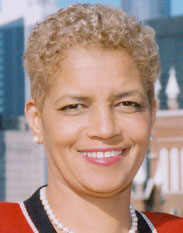 Shirley Clarke Franklin was born May 10, 1945 in Philadelphia, Pennsylvania; the daughter of Eugene Haywood Clarke and Ruth Lyons White. She attended an all-girls high school and following graduation enrolled in Howard University. At Howard she became active in the civil rights movement and earned a Bachelor of Arts degree in sociology in 1968. She left Howard for graduate study at the University of Pennsylvania in her native Philadelphia, earning a Masters degree in sociology in 1969.
Shirley Clarke Franklin was born May 10, 1945 in Philadelphia, Pennsylvania; the daughter of Eugene Haywood Clarke and Ruth Lyons White. She attended an all-girls high school and following graduation enrolled in Howard University. At Howard she became active in the civil rights movement and earned a Bachelor of Arts degree in sociology in 1968. She left Howard for graduate study at the University of Pennsylvania in her native Philadelphia, earning a Masters degree in sociology in 1969.
Franklin was introduced to city politics when her husband at the time, attorney David Franklin, was a key strategist for Maynard Jackson, who won election as Atlanta’s and the South’s first Black mayor in 1973. She joined the Jackson administration in 1978 and became the Commissioner of Cultural Affairs. When Andrew Young succeeded Jackson he named Franklin City Manager, making her the first woman in the nation to hold such a post in municipal government. In that capacity she managed a $1 billion budget and 8,000 city employees. During her tenure she oversaw the expansion of Hartsfield (now Hartsfield-Jackson) International airport, a new city hall and over 14,000 units of new housing in the city. Franklin was appointed the city’s executive officer for operations when Maynard Jackson returned as mayor for a third term following Young’s departure, and served in that capacity until 1991.
In 1991 she played a major role in helping secure the international Olympic games for Atlanta as a member of the Atlanta Committee for the Olympic Games. Franklin served as the senior vice president for external relations and played a principal role negotiating with groups seeking to win concessions from the organizing committee. In 1997 she established her own public affairs and strategic planning consulting firm, and one year later became a majority partner in Urban Environmental Solutions. She also returned to civic life in 1998 when she was appointed to the newly elected Georgia governor’s transition team. In 1999 she became vice chairwoman of the Georgia Regional Transportation Authority but resigned one year later to launch her bid for mayor.
Shirley Franklin made history again when she was elected the 58th mayor of Atlanta in 2001, succeeding Bill Campbell and becoming the city’s first woman chief executive. Upon entering office Franklin made the repair of the city’s aging sewer infrastructure a priority after Atlanta had been repeatedly fined by the Environmental Protection Agency (EPA) for its combined sewer system. Immediately following her January 2002 inauguration she announced the city was facing an $82 million deficit and she began to cut her staff and her own salary by $40,000. In 2005 she won a second term in office. Her straightforward style and no nonsense approach to governing earned her a “Profile in Courage Award” from the John F. Kenney Presidential Library.
Anthony Williams
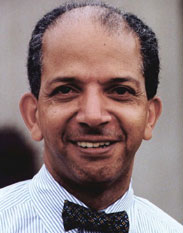 Born Anthony Stephen Eggleton on July 28, 1951 in Los Angeles, California and is the adopted son of Lewis Williams III and Virginia Williams. He did not begin speaking until he was three years old and his foster parents considered putting him in an institution. Luckily the Williams’ thought otherwise and entered into his life. His adopted parents renamed him Anthony Allen Williams.
Born Anthony Stephen Eggleton on July 28, 1951 in Los Angeles, California and is the adopted son of Lewis Williams III and Virginia Williams. He did not begin speaking until he was three years old and his foster parents considered putting him in an institution. Luckily the Williams’ thought otherwise and entered into his life. His adopted parents renamed him Anthony Allen Williams.
Williams attended Catholic school as a child and was a good student though he was said to have a short attention span. After graduating from high school in 1969 he considered the priesthood but instead enrolled in Santa Clara University. His days in college were marked by the anti-war movement, a cause Williams took up as a student activist. He was elected president of his sophomore class and worked for an organization that assisted draft dodgers who fled to Canada. Ironically, despite his anti-war activities, Williams quit college and joined the Air Force. He had dreams of being a pilot and applied to the U.S. Air Force Academy but was instead sent to its preparatory school due to his poor academic record at Santa Clara. Though he excelled in the preparatory school and earned admission to the Academy, Williams lost interest and eventually was granted an honorable discharge in 1974.
He then applied to Yale University but after two years quit to start a business and returned home to his parents. The business failed and he returned to Yale. While still in college he successfully ran for a seat on the New Haven Board of Alderman, and won re-election to that seat in 1982 only to resign and enroll in Harvard Law School. At Harvard he earned his law degree and master’s degree in public policy. A Harvard classmate hired Williams to serve as the head of neighborhood housing and development for the Boston Redevelopment Authority. In 1990 his classmate once again persuaded Williams to take a job as executive director of the City of St. Louis’ community development agency. During his tenure there he suffered a broken nose at hands of two city contractors he refused to pay because he felt that their work was insufficient.
In 1993 Williams became the first chief financial officer for the U.S. Department of Agriculture in the Clinton administration. In that role he managed $62.3 billion in funds and oversaw 29 agencies throughout the nation and world. Two years later Williams became a prime candidate for the newly created position of chief financial officer for the District of Columbia. He came into a city that was facing a $300 million deficit and the public school system was struggling to repair its aging infrastructure. That year Congress and the Clinton administration established a financial control board for the city. The board took over many of the functions of the mayor in the face of the city’s fiscal emergency. Over time his relationship with then mayor Marion Barry eroded and in May of 1998 Williams announced his candidacy. He won the Democratic primary in September of that year and went on to defeat Republican Carol Schwartz in the general election.
Williams is married to Diane Simmons and they have one child, Asantewa Foster.
Dennis Archer
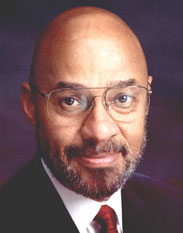 Dennis Wayne Archer was born on January 1, 1942 in Detroit, Michigan, the son of Ernest James and Frances Carroll Archer.
Dennis Wayne Archer was born on January 1, 1942 in Detroit, Michigan, the son of Ernest James and Frances Carroll Archer.
His family moved to a farm in the rural community of Cassopolis in the southwestern part of the state and faced significant hardship. The family house has no insulation or indoor plumbing so winters were brutal. Despite the difficult circumstances, Archer’s parents stressed the importance of education as a way out of poverty. He graduated from high school in 1959. Archer took classes at Wayne State University and the Detroit Institute of Technology, eventually enrolling at Western Michigan University and putting himself through college by washing dishes. He earned his bachelor’s degree in 1965 from Western Michigan and moved to Detroit. He became a teacher and worked with emotionally disabled children.
It was during his time in Detroit that he met his wife Trudy DunCombe, who encouraged Archer to go to law school. He took evening classes at the Detroit College of Law and earned a law degree in 1970. He eventually landed at a city law firm where he was made a partner. After a move to a more upscale neighborhood in the Motor City, Archer became active in city politics. He supported the re-election of Detroit Mayor Coleman Young and Congressman George Crockett among others. As his political profile grew larger, Archer soon found himself in line for a political appointment. While a partner in the firm of Charfoos, Christensen & Archer, he was appointed to the Michigan Supreme Court by then Governor James Blanchard.
In 1990 he gave up his secure appointment on the bench to return to private practice and prepare to launch a campaign for mayor of Detroit. His decision was bold given that the powerful incumbent, Coleman Young, had not announced whether he would seek a sixth term. When Young did decide he would not run again, he endorsed Archer’s rival Sharon McPhail. The election was bitterly fought and had racial overtones as Archer was accused of selling out to the white business establishment and being elitist. Despite the relentless attacks Archer prevailed and was elected mayor in November 1993 by a 57-43 percent margin, though he trailed among Black voters at the polls.
As mayor of one of the nation’s former industrial centers, Arched faced a formidable job in resurrecting the city. He pushed significant redevelopment projects in the city, including new stadiums for the Detroit Tigers baseball team and the Detroit Lions football team. Most significantly Archer brought casino gambling to Detroit as city voters approved gaming and licenses were awarded to three casino operators. Despite presiding over a drop in crime and unemployment Archer decided not to seek a thrd term in office in 2000. He returned to private practice as the chairman of the Dickson Wright law firm. In 2002 he made history when he was elected the first Black president of the American Bar Association.
Archer and his wife have two children, Dennis Wayne, Jr. and Vincent DunCombe.
Rep. Jesse Jackson, Jr.
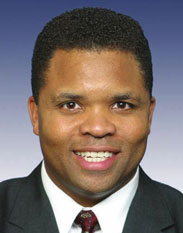 Jesse Louis Jackson, Jr. was born on March 11, 1965, the son of civil rights leader Rev. Jesse Louis Jackson and Jacqueline Jackson. Born while his famous father was with Dr. Martin Luther King, Jr. on the historic Selma to Montgomery voting rights march, the young Jackson appeared bound by his father’s path but established his own route once he became an adult. Jackson was an energetic and intelligent child who was known to be hyperactive. His parents placed him in a private military academy and from there he went on to the elite St. Albans Episcopal prep school. He excelled in the classroom and the athletic field at St. Albans, receiving scholarship offers from a number of major college football programs.
Jesse Louis Jackson, Jr. was born on March 11, 1965, the son of civil rights leader Rev. Jesse Louis Jackson and Jacqueline Jackson. Born while his famous father was with Dr. Martin Luther King, Jr. on the historic Selma to Montgomery voting rights march, the young Jackson appeared bound by his father’s path but established his own route once he became an adult. Jackson was an energetic and intelligent child who was known to be hyperactive. His parents placed him in a private military academy and from there he went on to the elite St. Albans Episcopal prep school. He excelled in the classroom and the athletic field at St. Albans, receiving scholarship offers from a number of major college football programs.
Jackson followed his father’s footsteps and enrolled in North Carolina A&T University, graduating in three years. He joined his father’s presidential campaign in 1988 and made a name for himself when he introduced his father at the Democratic National Convention in Atlanta. After the campaign ended Jackson entered the Chicago Theological Seminary, the same graduate school his father attended, and received a master’s degree in divinity. From there he enrolled in the University of Illinois College of Law and received a law degree in 1993.
Following law school Jackson went to work for his father’s organization, the Rainbow Coalition, as its national field director. He took it upon himself to transform the organization technologically and establish new local chapters throughout the country. Still, in the eyes of many, his success was attributable to his famous father and soon Jackson began laying the groundwork to make his own mark politically. He moved to Chicago’s South side in the Second Congressional District, poised to challenge the incumbent Mel Reynolds. The match up never occurred as Reynolds lost his seat when he was convicted and jailed over a relationship with a minor and a financial transgression. Jackson then faced popular state Senator Emil Jones, who was supported by the city’s political establishment. Jackson prevailed and was elected to the 104th Congress in 1995.
Jackson currently serves on the House Appropriation Committee. He and his wife Sandra have two children, Jessica Donatella and Jesse, III.
Department of Education / Department of Defense
General Colin L. Powell
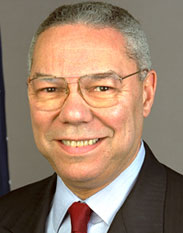 Colin Luther Powell was born in Harlem in New York City on April 5, 1937, the son of Jamaican immigrants. He spent much of his early years in the South Bronx and was a fairly average student as a young man. Powell’s potential became evident while a student at City College in New York where he excelled in the Army’s Reserve Officers’ Training Corps (ROTC). He graduated from the program with the rank of cadet colonel, the highest awarded, and was commissioned as a second lieutenant and assigned to duty in West Germany.
Colin Luther Powell was born in Harlem in New York City on April 5, 1937, the son of Jamaican immigrants. He spent much of his early years in the South Bronx and was a fairly average student as a young man. Powell’s potential became evident while a student at City College in New York where he excelled in the Army’s Reserve Officers’ Training Corps (ROTC). He graduated from the program with the rank of cadet colonel, the highest awarded, and was commissioned as a second lieutenant and assigned to duty in West Germany.
Following a stint at Fort Devens in Massachusetts, where he met his wife Alma, Powell was sent to Vietnam where he was wounded in action. During a second tour in Vietnam he was awarded the Soldier’s Medal for pulling several men from a burning helicopter. After returning to the stateside Powell earned a Master’s degree in business administration from George Washington University and secured a job as an analyst at the Pentagon. Shortly thereafter he was named a White House Fellow in the Office of Management and Budget under director Caspar Weinberger and deputy Frank Carlucci, two names that would have staying power inside the Beltway for decades.
In 1987 Powell replaced Carlucci as National Security Adviser in the administration of President Ronald Reagan. Under President George Bush he was promoted to the rank of four-star general and took over the Army’s Forces Command, an assignment that made him responsible for the readiness of military troops. General Powell was named chairman of the Joint Chiefs of Staff by President Bush in 1989, the first Black officer to hold the post. His public profile increased during Operation Desert Storm in 1991 and he was awarded a Congressional gold medal for his leadership during the military operation.
Powell was appointed Secretary of State by President George W. Bush in 2000. It was a bittersweet assignment for the general. He found himself the sole believer of the efficacy of diplomacy and was isolated in the Bush administration. Powell was particularly vocal in his opposition to an invasion of Iraq and found himself mired in controversy from an appearance before the U.N. Security Council, during which he made claims against Iraq based on faulty intelligence. Despite his reservations about invading Iraq, Powell s publicly supported the President. Powell stepped down as Secretary of State following President Bush’s re-election in November 2004.
General Powell and his wife Alma have three children, Michael, Linda and Annemarie. The eldest, Michael, was Chairman of the Federal Communications Commission (FCC) from 2001 to 2005.

today in black history
May 11, 2024
Ira Aldridge, the great 19th century Black actor, famous throughout the world, was born in 1807 in New York City.
Blacks in Line for White House Appointments
Key positions up for grabs
POSTED: November 16, 2008, 12:00 am












